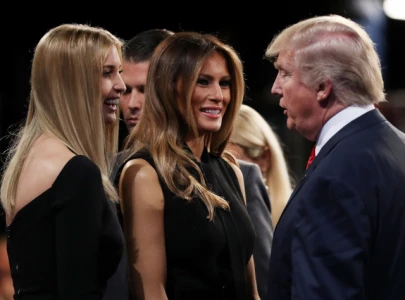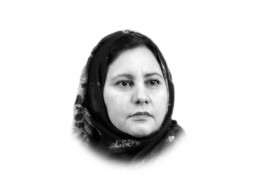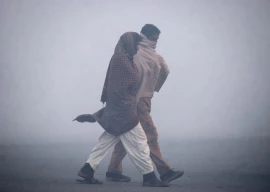For many observers, both in Pakistan and the US, it is perhaps, the first time in several years that there is an indication showing the Pakistan Army understands the gravity of the threat and is ready to resolve the issue of militancy with seriousness.
What has stopped the army from taking this step for so long? Many observers, including Ahmed Rashid in his recent article in Financial Times and Kamran Shafi writing for this newspaper “This is not our war? Still?” (August 16) criticised the military’s ‘double role’ and infatuation with ‘strategic depth’ in the region as a reason for its unwillingness to go against the militants. The premise of such an argument assumes that the policymakers in the army are somehow irrational and want to support the militants who are harming them. As a rational actor, I believe that the generals are not plain stupid to allow such a thing. Going beyond this conventional wisdom might suggest a different, more plausible reason why, in fact, the army has been unwilling to go against these groups. The analysts have to first understand that due to the secrecy of the nature of intelligence and operations, there is a lot that the military cannot share with the public; hence, our analysis should give some benefit of the doubt to an entity that can’t truly defend itself.
Second, there is a need to understand the difference between actively supporting militants and being in communication with them and having the ability to influence them. It is preposterous to believe that the army has enough power to dictate and control each and every action of these militant groups. However, it does have the ability to influence these groups, but to what extent is something that is exaggerated far too much. There is also a reason why the army wants to maintain communication with these groups.
Sooner or later the US will be out of Afghanistan and Pakistan, alone, will be left with militants on ground. The army, with its meagre resources and crippling economy, cannot only have a military solution against these sons of the soil. Thus, it maintains communication with them while also keeping these groups under check, so that in the aftermath of the US withdrawal, Pakistan is not set on fire by them. Third, the crises in the economy severely restrict military operations against these groups. That is why in the past, the military has always resorted to a quick political solution after an assault on the militants.
The military has thus, for far too long, tried to strike a balance between its legitimacy in the international world, making war on its own people and maintaining domestic stability. Its efforts have been perceived as ‘back-stabbing’ and at times as evidence for ‘support’ for militancy. However, things are predicted to change with General Kayani’s speech reflecting a certain understanding and consensus within the army and with the US army on the future direction against militancy. The army has come out with a strong fist against militants.
Given the socio-economic situation in Pakistan, the political instability, and recent tensions with the US, there is obvious nervousness within the army. It will be interesting to see how it will make its progress to victory in the North Waziristan operation. Much will depend on the support of the people of Pakistan and the domestic political actors who will have to set aside their petty politics and make sure that the army completes its job in flushing out the militants from Pakistan.
The operation in North Waziristan, which comes at a pivotal moment, right before the elections in the US and in Pakistan is likely to decide the future course of US-Pakistan relations and the domestic security situation of Pakistan. For the US, Pakistan’s indication to move into North Waziristan brings glad tidings and a reassurance that it is a partner in its war on terror. The operation is a unique moment to sort out the grievances between the two countries and will require extensive cooperation in order to defeat the militancy in Afghanistan and Pakistan.
Published in The Express Tribune, August 28th, 2012.
COMMENTS (15)
Comments are moderated and generally will be posted if they are on-topic and not abusive.
For more information, please see our Comments FAQ

1726117332-0/Megan-Thee-Stallion-(1)1726117332-0-165x106.webp)

















@Austin: What will happen is the complete opposite. You should be embarrassed for pointing out exactly why Pakistan's repeated attempts to be strategically clever are usually failures when, by the way you said it, you're obviously amongst the ones who are still dreaming when it comes to Pakistan's actual position that it has ended up in. For such a small concept, the space between the two is the same as life and death. If people listen to you, they choose death.
If Pakistan does not go after the haqanies now, in 2014, these groups will move to Afghanistan. They will take on the Afghan Government. TTP may also shift their fighters to Afghanistan to help the Afghan Taliban. This may bring some stability to Pakistan. Thus the Government should refrain from attacking N Waziristan.
The author is not clear in his analysis and is shying from a direct accurate comment and giving too much space to the army. Generals sitting in their large offices do not neccessarily see the reality. Kayani is doing a U turn after being in power for 5 years, rather a long period for seeing a problem that has been obvious to the rest of the world,and deciding on developing strategy to counter it. Army, at one stage did have the power to control these militants but are guilty of not realising the dangers of allowing this Frankenstein to prosper. Even now, many are convinced that the dimension of the problem is directly proportional to the time allowed without action against TTP and other similar organisations.
The world accomplished much more than that in the battle against National Socialism. The thing was, once the element of coercive fear was removed, the Nazis lost much of their power over men's minds. That's why negotiating a political settlement would be a step backwards, not forwards.
"At the same time, it is perhaps, a very timely opportunity for Pakistan to clarify its position to those in the United States who have, in the past few years, grown critical and suspicious of Pakistan’s loyalties." Pakistan does not have to show any loyalty to any country, it is all about self interest,what is good for Pakistan. Americans always keep their interest before anything else to deal with other States. Hussain Nadim does not realize that Baluchistan is already on fire and now the Army is about to light another fire in the North Waziristan, the consequences of this attack will be far reaching. Does he know that Pakistan was left holding the bag after Russians were defeated, what happened to the America's loyalty to Pakistan after being a front line State and in the process is paying a very heavy price. It is not in the interest of Pakistan to be opening another front and killing it's own citizens, we should never forget the reasons why Bungla Desh seceded.
It's a pipe dream that all militants can be killed or jailed to win the war. History tells us that the best one can hope for is to militarily fight the Taliban to a stalemate and then negotiate a political settlement.
http://www.riazhaq.com/2008/10/us-nato-fight-to-stalemate-in.html
I am sure that now, as we are being told that the bugles have been sounded, all of our drawing room warriors will step forward and volunteer their services in order to take on this great mission. There is surely a lot that needs to be done as we are being encouraged to follow in the foot steps of the great Mughals, the British, the Russians and of course the Americans and complete the job that they could not. The challenge has been thrown and the opportunity is there to prove our mettle on the battle ground, away from the computer screens, comfy cafes and coffee houses. If history is any guide, this struggle is bound to take a couple of generations to complete and so will provide all the opportunities that are needed for the many key board Napoleans, Rommels, Guderians, Montgomerys and Eisenhowers. So let every one hurry, lest this "pivotal moment" and "timely opportunity" is missed.
Unfortunately, the August 14, 2012 speech by Kayani has come a bit too late, albeit under the compulsions, both external and internal, heaped upon Pakistan by its allies in the Arab world such as Saudia, traditional backers from the west such as USA/EU, economic downslide, deteriorating law and order situation. It did not come as a genuine change of mind as a result of soul searching, introception, or rethinking of the ideology of hate and intolerance.
This is all Noora-Kushti (shadow-boxing) to garner more dollars.
The proof of the pudding is in the eating - now let's see when that happens.
Pakistan Army should understand that it is now or never. They need to clean the house.
Much has been said about Kayani's speech however one speech doesn't make a policy and other than rumors there has been no change in military operations. The American policy of judging Pakistan by what it does rather than what it says remains a prudent policy.
Interesting analysis. The North Waziristan is indeed going to define the future of US-Pak relations in the long run.
Again kiyani is misleading and the West deserves praise for their exceptional half wittedness which pakistani establishment will continue to exploit for eternity. Its common sense now as US elections are near so these sort of statements from kiyani are expected that are mostly given to appease US's aid flow. Also pakistan army and the top brass confuses the nation on regular basis by associating TTP with india and other so called foreign enemies of pakistan. Also who is going to monitor the pakistani operation in NW even if there is one in future? what is the mechanism to ensure that pakistan is serious about eliminating insurgents or terrorists destablizing afghanistan?
the truth is that pakistan is not serious and in fact was never serious in fighting war on terror. the most rediculous, ironic and hilarious fact is that pakistan lost 35000 of its own citizens in this war, suffered economic loss of over 60billion $, lost investments sports etc but still hasnt declare al qaeda (AQ) a terrorist organization. its is only nation participating on war on terror that has still failed to declare AQ as a terrorist org. this means that helping AQ is not a crime in pakistan.